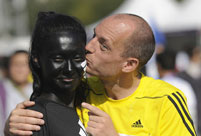Beijing will produce more incentives and work harder to promote its 72-hour visa waiver to attract more transit passengers.
Authorities in the Chinese capital said they are considering offering discounts at hotels and shopping areas for tourists, as well as working more with airlines to publicize the policy more.
Beijing Capital International Airport's planning and development department said visitors might get exclusive discounts on dining and free accommodation if they spend a certain amount at the airport.
The Beijing General Station of Exit and Entry Frontier Inspection also said it will cooperate more with airlines, flight associations home and abroad, and tourism bureaus to make sure more travelers are informed of the visa exemption.
The station promised to simplify the transit application process.
Ji Lixia, the general station's assistant director, said the process has become easier than it was earlier this year, when applying for the visa exemption took a lot of time and effort, and that it now takes tourists only two minutes after they land.
"Our staff members are fluent in English and 18 other languages to ensure the language barrier does not stand in the way of transit tourists," she said.
"The number of daily applicants has soared to 60. That's impressive compared with the handful of tourists in January."
A Russian visitor who arrived in Beijing on Friday said it was the first time he had tried the 72-hour visa waiver, and found it convenient.
"I found information about the visa exemption on the Internet," said Sergey, who declined to give his last name. "I will go on a business trip to Japan and it's very convenient to check out China before that, and it's without a visa."
He said he had not made up his mind where in Beijing he will go, but thought 72 hours is a reasonable duration.
Introduced on Jan 1, the Beijing visa exemption allows tourists from 45 countries to stay in the capital for three days without a visa.
The program had attracted 10,191 transit passengers as of Oct 19, with 5,270 visits during the first half of the year.
The countries whose citizens are eligible for the exemption were decided in accordance with the backgrounds of visitors Beijing and Shanghai had received during the past few years, according to the Beijing government.
Most applicants for the visa-free stay are from Russia, the United States and Germany, and most took flights from Air China, Hainan Airlines, Hong Kong Airlines and Russia's S7 Airlines, the station said.
June had the most monthly transit visits — 1,165.
Ji said nearly all transit passenger applications are approved. Occasionally, several applicants are denied because they are not from the 45 specified countries and regions.
Yang Jinsong, a researcher at the China Tourism Academy, said the government should look at the spending habits of tourists from the 45 countries and come up with specialized tour packages tailored to their preferences.
"Some of the tour packages made years ago are not attractive to foreigners today," he said.
"For example, considering some of them are on business trips, the government can come up with three-day tours around the city that show its business potential as well as new attractions for these tourists."
The station and airport also warn visitors planning to come to Beijing without a visa to fully understand the details of visa waiver policy to avoid unnecessary troubles.
"The policy applies only to foreign visitors with a ticket heading for a third country, rather than a third city. For example, someone from Los Angeles cannot stay in Beijing without a visa if he is destined to go to San Francisco afterward," Ji said.
Visa-free tourists cannot go outside the capital during the three-day visit or extend their stay. Those who must can apply for permission to the city's Public Security Bureau, she said.
 Annual airshow kicks off in Houston
Annual airshow kicks off in Houston U.S. Navy Carrier Strike Group stages military exercises
U.S. Navy Carrier Strike Group stages military exercises Volkswagen showcases new energy vehicles in Beijing
Volkswagen showcases new energy vehicles in Beijing  How should we get married nowadays?
How should we get married nowadays?  Commentary:
Commentary: Jakie Chan sees Rubber Duck off in Beijing
Jakie Chan sees Rubber Duck off in Beijing Lingerie show dazzles Wuhan Motor Show 2013
Lingerie show dazzles Wuhan Motor Show 2013  Running in fun customs at Beijing Int'l Marathon
Running in fun customs at Beijing Int'l Marathon  Weekly Sports Photos
Weekly Sports Photos Unveil PLA air force base
Unveil PLA air force base  Say goodbye to tube-like apartment building
Say goodbye to tube-like apartment building Oriental education or western education?
Oriental education or western education? China in autumn: Kingdom of red and golden
China in autumn: Kingdom of red and golden National Geographic Traveler Photo Contest
National Geographic Traveler Photo Contest Chinese screen goddesses from Beijing Film Academy
Chinese screen goddesses from Beijing Film Academy Day|Week|Month